The Tree of Tough Love: An Interview with Ben De Loenen
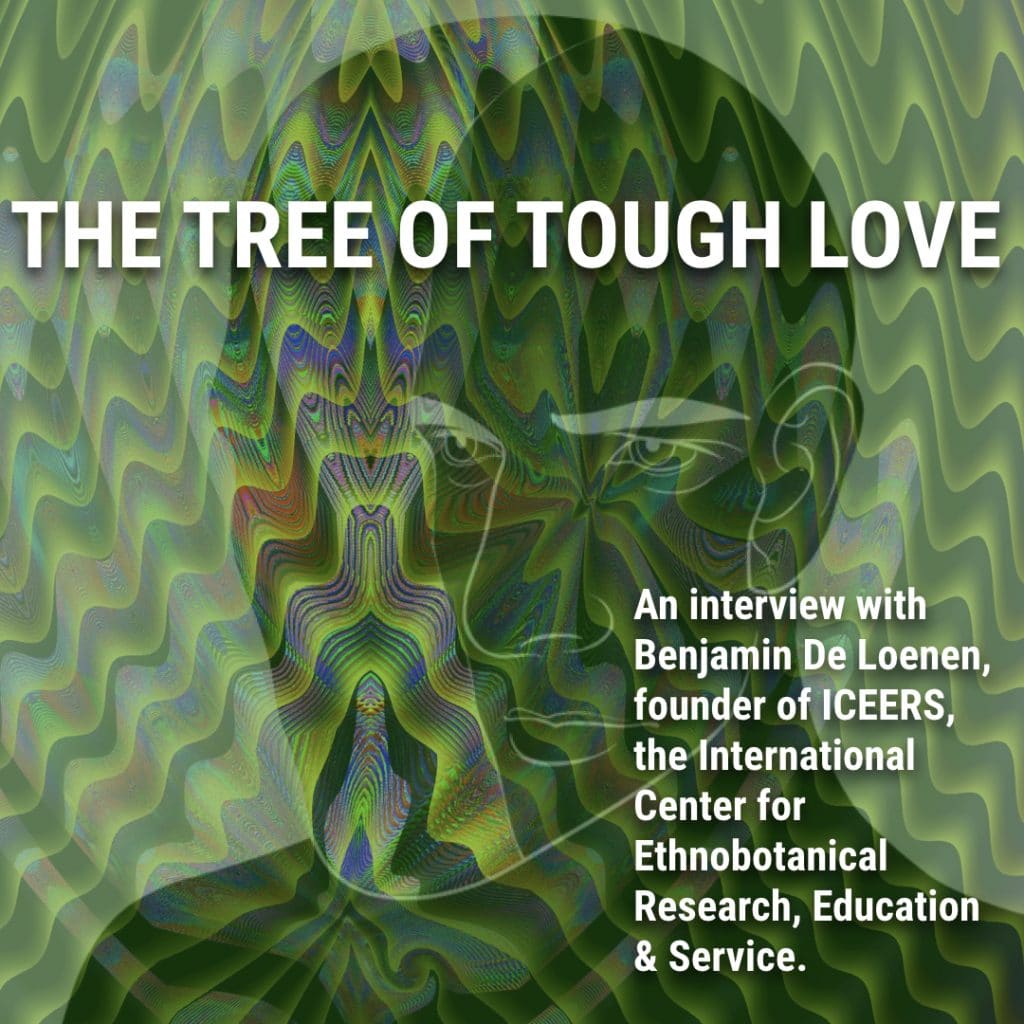
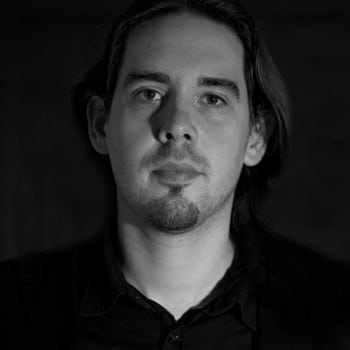 Benjamin De Loenen is the founder of ICEERS (International Center for Ethnobotanical Research, Education & Service) a philanthropic non-profit whose mission is to educate humanity about the power of plant medicines through gathering, researching, and sharing knowledge about the special properties of these plants and educating the public about the need to integrate these medicines and their teachings into our current society. Ben is also a filmmaker and creator of the 2004 film Ibogaine: Rite of Passage, which he made as a graduate thesis project.
Benjamin De Loenen is the founder of ICEERS (International Center for Ethnobotanical Research, Education & Service) a philanthropic non-profit whose mission is to educate humanity about the power of plant medicines through gathering, researching, and sharing knowledge about the special properties of these plants and educating the public about the need to integrate these medicines and their teachings into our current society. Ben is also a filmmaker and creator of the 2004 film Ibogaine: Rite of Passage, which he made as a graduate thesis project.
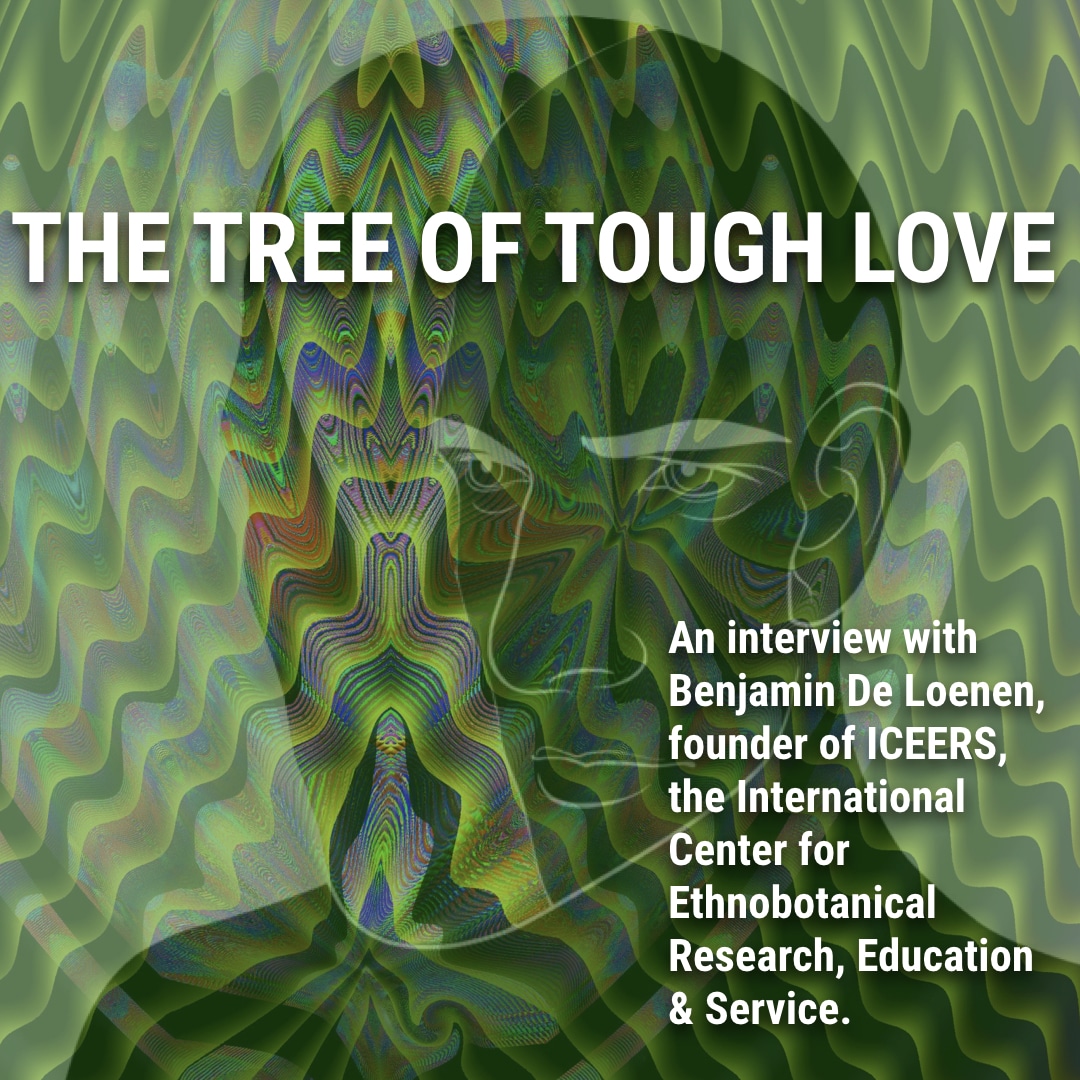
Ben actually took ibogaine for the first time five years after the making of his film on the topic. The setting was at a center in San Pancho, Mexico that hosted the 2009 ibogaine conference in Sayulita that Benjamin was attending. This is a description of his journey.
“It was an ego death, but not like in, not knowing where you are and who you are–rather for me, it totally destroyed my idea about myself and how I already had achieved things. It was very humbling, very much, kind of putting me in my place. In the beginning it made me feel like a helpless little boy, but then very constructively at the same time, it was like, okay, if you want to go where you want to go, you need to face fears. It was very much about facing fear, about taking responsibility.
There were teachings about life on this planet, not cosmic, so much as the connection with everything here. It was very practical in a way and at the same time, very profound. It was also about the connection with my ancestors, direct ancestors, so with my father, his father before, the male line, and how to understand human evolution in that sense. How your past informs your present—you are passing on to the next generation what you have learned, your limitations as well.
Iboga was like a parent–a tough love father figure coming in and teaching me some things I hadn’t learned as yet.
The interesting thing was that before iboga, I had done ayahuasca several times. So after my visionary phase of the experience—about 10 hours—was finished, I felt that it completely failed, that it was a horrible experience, that I had just suffered; my experience didn’t do anything constructively, and I asked myself why I had dedicated five years of my life making a film and doing public speaking about ibogaine. I felt it was horrible.
But then, I didn’t know it was not the end of the experience.
That’s when the second phase kicked-in, which was a 24-hour phase where all the material of the first 10 hours started to fall into place. I got an emotional connection to the images, which for me had felt superficial at times in the first visionary phase. The images were more like concepts, cognitive, and not very profound, so there was no space for emotions—maybe one little moment, but for the rest it was all very much feeding me information. Sometimes I didn’t even get what it meant–and that’s where in the second phase all started to make sense. It was very practical afterwards as well.
Things would happen in my daily life and I would feel new emotions that I didn’t know before, new reactions. So I realized that things had also changed subconsciously.
Iboga has a big subconscious part, things you don’t know while you’re in the experience. In the moment of the experience you don’t know the extent of everything that has changed. For me, even two and a half months later I was still fully running in process. It was very long for me. It was challenging at the same time because you go back to daily life and then things have changed. Why is that? Where does it come from? Who am I now?
Lakshmi: Yes, totally. That happens with ayahuasca or with any powerful inner journey too.
Ben: Yes, even though for me, because ayahuasca has more of an emotional connection to the images, the whole experience is more emotional. So for me, integration of the ayahuasca experience starts during the experience. The impact or the process of integration is shorter for me generally with ayahuasca, even though there might have been a deep mystical experience with ayahuasca.
Lakshmi: So, you said it was cognitive? I feel when you are in those experiences it’s like you’re in whole mind cognition–heart and mind together.
Ben: It wasn’t emotional, it was analytical. The cognition part was very much in the second phase, not in the first, not during the visions. Automatic cognition, not thinking linearly “What did this mean?” It’s just a process that unfolds automatically, which is different from say an ayahuasca experience that you’re integrating. You’re kind of thinking about what the experience was. While here, that second phase was part of the experience.
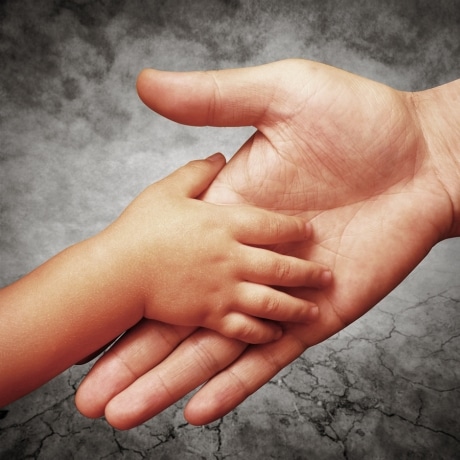 It is very, very profound. I never wanted children until I did iboga. So that’s a big change.
It is very, very profound. I never wanted children until I did iboga. So that’s a big change.
Lakshmi: How so?
Ben: I was convinced I would never have a child in my life, and then I did iboga, and that completely changed
Lakshmi: Oh, you have a child now?
Ben: Yeah, I have a four-year-old girl.
Lakshmi: I see. So it changed your mindset somehow, your feeling that you wouldn’t be able to do that, into a positive feeling. Something like that?
Ben: Yeah, I think that what mostly impacted me—the harshness–was about realizing the fear that’s underneath the surface of my character and how it influences decision-making. Being more aware of that was very difficult because you become more aware in the experience, but afterwards you’re also still more aware about fear.
But the beautiful, most enriching part of it was understanding parenting and the process of passing on from generation to generation. I understood it with much more depth afterwards. The beauty of it, the depth of it, and the richness. And that’s why I wanted a child, because I realized I wanted to be able to pass on and be part of our human experience.
Lakshmi: The family tree, in a way, the roots and all of that.
Ben: It connected me with my roots. In Gabon during the Bwiti ceremony, the first night they die in their experience and go to the land of the ancestors, and they get information from the ancestors that’s going to be useful in their daily life afterwards.
It’s a death-rebirth; it’s an initiation from a young boy to a man or from a person who’s ill to being healed.
And that was in a way what it was for me as well. It was connecting the ancestors, my parents, my grandparents and so forth, getting useful insights that are going to help you in life afterwards, and really it was a rite of passage. First it destroyed my ego; it made me feel like a little helpless boy, and then it built me up again. Even though the setting was in a comfortable clinic bed at Awakening the Dream in Mexico instead of in Gabon. It was in a clinic, but not a very “clinical” setting. It was after a conference. They were the hosts of the conference and afterwards I had the opportunity.
The ibogaine experience had the quality of a rite of passage in a very profound way.
Watch Ben de Loenen’s 2004 film of the same name linked below
Origins and Sustainability
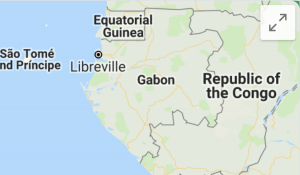 Lakshmi: People bring up sustainability a lot with regard to iboga. The Gabonese, where this knowledge and the Tabernathe iboga tree originate are angry with the other plantations for poaching; they want to have the Nagoya Protocol enforced. What do you think about that whole situation?
Lakshmi: People bring up sustainability a lot with regard to iboga. The Gabonese, where this knowledge and the Tabernathe iboga tree originate are angry with the other plantations for poaching; they want to have the Nagoya Protocol enforced. What do you think about that whole situation?
Ben: Well, it’s complex. Gabon and the stakeholders there are not against plantations in other places of the world as far as I understand it, but they want restorative justice because Gabon has suffered a lot from the poaching. The question is how can the demand for ibogaine be met with sustainable sources and how can profits from that market give back to the indigenous communities and their botanical resources. Blessings of the Forest has been an important organization working in Gabon to advance new laws that allow law enforcement to go after poachers, do inventories of the iboga plants growing in wild. Recently the news came that a truck with a lot of ivory and iboga was intercepted. It shows the situation is very bad, and I think it is of utmost importance that this situations is resolved and that people are conscious about the sustainability issues of iboga. For me sustainability comes first, even though people are dying, we can’t empty the Amazon or Gabonese rainforests and deprive indigenous peoples of their sacred plants. As we move as an international community towards regulation or self-regulation this is a key dimension to address. For now, the current state of the ibogaine market is that it is mostly the Wild West out there… There are people who are eager to self-regulate and uphold a sense of collective responsibility and ethics, and there are others who prefer the Wild West situation.
Lakshmi: That’s right, and the reason many people like it is that if it becomes legitimized, there are medical oversight regulations. If it becomes regulated, many people would be out of the loop because they would not be qualified in that medical context to give treatments. But I see the problem, it’s kind of selfish to hold onto the status quo and therefore try to curtail its spreading. People are dying and suffering. That suffering is real, and so if you just say, okay, there is suffering in Gabon in the past, there is suffering that is happening right now; it’s destroying whole communities. I know that part of the problem is that of America and pharmaceuticals, but on a humanitarian level, these are people and they are dying.
Everybody came from Africa, the first Adam, the first gene, the first of our ancestral male line–all from Africa. So in my mind, it’s like one family. This is where I’m at, how can we really bring this community together at a higher level of coherence? Maybe you can help, and we can help each other because we really want the same thing, which is a balanced response to the situation. So to put all the focus on restoration and therefore close the gates to medicalization in the US, which is what’s needed, because you can’t do it without medical protocols when there’s all these addicts with all these problems, right?
Ben: I wonder if it’s going to be well done, because when the investment comes in, will steps be taken carefully and slowly? Will a center treat one person at a time? Are they going to treat six people at a time? It’s very complex medicine; even if it’s medicalized, it needs to be well done. The people doing it need to really understand that this is really difficult; the safety profile of ibogaine is complicated and detoxing people from severe drug dependency is highly complex too. In Gabon it was clear when I filmed the initiation in 2004 that the whole community gave extreme care to the initiate. They clearly knew it was a serious process and they have very strict protocols they followed.
Look at the way the ceremonies work, through months of preparation, then the whole community’s together. They support one person going through that process very carefully. They’re always present; they never leave them alone, not for one second. I have seen other realities in ibogaine centers where people were left alone at times during the treatment, where there was virtually no preparation or aftercare, etc. Incidents happen unfortunately in settings that are not prepared and equipped for the complex work with this plant. That’s a big problem. So it is the Wild West out there, and I believe it is important to more towards more (self-)regulated contexts.
One important obstacle to get governments and the medical establishment interested has always been lack of clinical trials. This is one of the things ICEERS is working on. One is in Brazil. Now just maybe a month or so ago, we got the approval for a trial in Spain, treating in a hospital, a very serious, very reputable hospital where they’ll administer ibogaine, which will generate hard clinical data coming out of that. That’s what’s needed to go to policy makers, to more serious institutions, and say this is real, the potential is real since I’m in a clinical trial. Until now, most of them say it’s too dangerous, and there’s no evidence because there are no clinical trials. There have been arguments for many years, and in a way there have never been clinical trials, because when they started doing them there were patent fights. Then, very importantly, as these practices become regulated, the sources of ibogaine will have to be traceable to the source. But for now, psychoactive plants coming from ancient cultures are still very taboo and misunderstood.
Lakshmi: We have to change culture. In the US and Europe, the conditioning of our attitudes towards drugs has been going on for decades, and if you’re a Christian culture it’s been going on since the first law, “do not eat of the fruit of this tree.” It’s deeply embedded in us. And then during the 17th Century the missionaries demonized shamanism because they wanted to promote Christianity.
Ben: Well, its very embedded in our culture.
Lakshmi: Yeah it is, but that’s because people have lost touch with what happens when you take these medicines, and so they dwell in fear of the shadow.
Ben: But that’s a bigger work that we need to do; that’s really what integrating plant medicine into our societies is all about.
About the Interviewer
 Lakshmi Narayan is the founder and editor of awake.net, a non-profit collective wisdom blog about the inner journey with entheogens, and founder and creative director of Awake Media a digital media company offering media products and services to clients in integrative health, transformational technology, and mind-body-spirit healthcare. She has a decades long interest in the cause of repositioning psychedelics in the public mind, and educating people about the benefits, cautions, best practices, and timeless wisdom that can be had from these experiences.
Lakshmi Narayan is the founder and editor of awake.net, a non-profit collective wisdom blog about the inner journey with entheogens, and founder and creative director of Awake Media a digital media company offering media products and services to clients in integrative health, transformational technology, and mind-body-spirit healthcare. She has a decades long interest in the cause of repositioning psychedelics in the public mind, and educating people about the benefits, cautions, best practices, and timeless wisdom that can be had from these experiences.
Copy editor: Eric Swenson
Cover art donated by Sumapano.
Background pattern by Frank Bonilla
Animation created in collaboration with designer Jeffrey Bean.
Subscribe to Awake Events & Posts


Responses